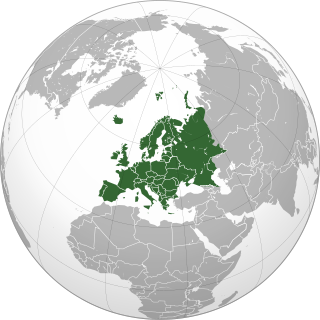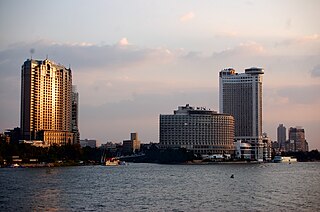
Cairo is the capital of Egypt. The city's metropolitan area is one of the largest in Africa, the largest in the Middle East, and the 15th-largest in the world, and is associated with ancient Egypt, as the famous Giza pyramid complex and the ancient city of Memphis are located in its geographical area. Located near the Nile Delta, modern Cairo was founded in 969 CE by the Fatimid dynasty, but the land composing the present-day city was the site of ancient national capitals whose remnants remain visible in parts of Old Cairo. Cairo has long been a centre of the region's political and cultural life, and is titled "the city of a thousand minarets" for its preponderance of Islamic architecture. Cairo is considered a World City with a "Beta +" classification according to GaWC.

Deobandi is a revivalist movement within Sunni Islam. It is centered in India, Pakistan, Afghanistan, and Bangladesh, has spread to the United Kingdom, and has a presence in South Africa. The name derives from Deoband, India, where the school Darul Uloom Deoband is situated. The movement was inspired by scholar Shah Waliullah Dehlawi (1703–1762), and it was founded in 1867 in the wake of the First War of Indian Independence in northern India a decade earlier.
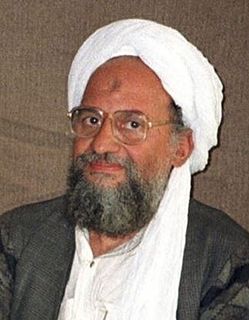
Ayman Mohammed Rabie al-Zawahiri is the current leader of al-Qaeda and a current or former member and senior official of Islamist organizations which have orchestrated and carried out attacks in North America, Asia, Africa, and the Middle East. In 2012, he called on Muslims to kidnap Western tourists in Muslim countries.

Atef Muhammad Ebeid was an Egyptian politician who served in various capacities in the governments of Egypt. He was Prime Minister of Egypt from 1999 to 2004.
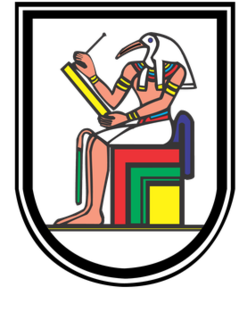
Cairo University is Egypt's premier public university. Its main campus is in Giza, immediately across the Nile from Cairo. It was founded on 21 December 1908; however, after being housed in various parts of Cairo, its faculties, beginning with the Faculty of Arts, were established on its current main campus in Giza in October 1929. It is the second oldest institution of higher education in Egypt after Al Azhar University, notwithstanding the pre-existing higher professional schools that later became constituent colleges of the university. It was founded and funded as the Egyptian University by a committee of private citizens with royal patronage in 1908 and became a state institution under King Fuad I in 1925. In 1940, four years following his death, the University was renamed King Fuad I University in his honor. It was renamed a second time after the Egyptian revolution of 1952. The University currently enrolls approximately 155,000 students in 22 faculties. It counts three Nobel Laureates among its graduates and is one of the 50 largest institutions of higher education in the world by enrollment.

Muḥammad 'Abduh was an Egyptian Islamic jurist, religious scholar and liberal reformer, regarded as one of the key founding figures of Islamic Modernism, sometimes called Neo-Mu’tazilism after the medieval Islamic school of theology based on rationalism, Muʿtazila. He also wrote, among other things, "Treatise on the Oneness of God", and a commentary on the Qur'an.
Liberalism in Egypt or Egyptian liberalism is a political ideology that traces its beginnings to the 19th century.
The April 2005 attacks were three related incidents that took place in the city of Cairo, Egypt, on 7 April and 30 April 2005. The latter two incidents are generally considered to have been minor, in that they caused no loss of life other than those of the perpetrators and appear not to have been planned in advance. In the first attack, however, three bystanders were killed. Neither sophisticated methods nor sophisticated materials were used in the incidents, and the Egyptian authorities have consistently described the attacks as "primitive".

Armenians in Egypt are a community with a long history. They are a minority with their own language, churches, and social institutions. The number of Armenians in Egypt has decreased due to migrations to other countries and integration into the rest of Egyptian society, including extensive intermarriage with Muslims and Copts. Today they number about 6000, much smaller than a few generations ago. They are concentrated in Cairo and Alexandria, the two largest cities. Economically the Egyptian Armenians have tended to be self-employed businessmen or craftsmen and to have more years of education than the Egyptian average.
Targets of terrorism in Egypt have included government officials, police, tourists and the Christian minority. Many attacks have been linked to Islamic extremism, and terrorism increased in the 1990s when the Islamist movement al-Gama'a al-Islamiyya targeted high-level political leaders and killed hundreds in its pursuit of implementing traditional Sharia law in Egypt.
Arabs in Pakistan consist of migrants from different countries of the Arab world, especially Egypt, Oman, Iraq, Kuwait, Syria, Libya, Saudi Arabia, Palestine, Jordan and Yemen and have a long history. The first form of contact between the Arab people and modern-day Pakistan originally came in 711 to Sindh, known as Nairs when Muhammad bin Qasim, an Arab military general, was on a quest to free Muslims and their families who had apparently been arrested by Raja Dahir's soldiers while they were returning in a merchant ship to their homes in Iraq's city of Basra from Sri Lanka.

The Bahá'í Faith in Egypt has existed for over 100 years. The first Bahá'ís arrived in 1863. Bahá'u'lláh, founder of the religion, was himself briefly in Egypt in 1868 when on his way to imprisonment in `Akká. The first Egyptians were converts by 1896. Despite forming an early Bahá'í Local Spiritual Assembly and forming a National Assembly, in 1960 following a regime change the Bahá'ís lost all rights as an organised religious community by Decree 263 at the decree of then-President Gamal Abdel Nasser. However, in 1963, there were still seven organized communities in Egypt. More recently the roughly 2000 Bahá'ís of Egypt have been embroiled in the Egyptian identification card controversy from 2006 through 2009. There have been homes burned down and families driven out of towns.

Ahmadiyya is an Islamic revival or messianic movement founded in Punjab, British India, in the late 19th century. It originated with the life and teachings of Mirza Ghulam Ahmad (1835–1908), who claimed to have been divinely appointed as both the promised Mahdi and Messiah expected by Muslims to appear towards the end times and bring about, by peaceful means, the final triumph of Islam; as well as to embody, in this capacity, the expected eschatological figure of other major religious traditions. Adherents of the Ahmadiyya—a term adopted expressly in reference to Muhammad's alternative name Aḥmad—are known as Ahmadi Muslims or simply Ahmadis.

The Cairo fire, also known as Black Saturday, was a series of riots that took place on 26 January 1952, marked by the burning and looting of some 750 buildings—retail shops, cafes, cinemas, hotels, restaurants, theatres, nightclubs, and the city's Opera House—in downtown Cairo. The direct trigger of the riots was the killing by British occupation troops of 50 Egyptian auxiliary policemen in the city of Ismaïlia in a one-sided battle a day earlier. The spontaneous anti-British protests that followed these deaths were quickly seized upon by organized elements in the crowd, who burned and ransacked large sectors of Cairo amidst the unexplained absence of security forces. The fire is thought by some to have signalled the end of the Kingdom of Egypt. The perpetrators of the Cairo Fire remain unknown to this day, and the truth about this important event in modern Egyptian history has yet to be established. The disorder that befell Cairo during the 1952 fire has recently been compared to the chaos that followed the anti-government protests of 28 January 2011, which saw demonstrations take place amidst massive arson and looting, an inexplicable withdrawal of the police and organized prison-breaking.

Mohamed Morsi is an Egyptian politician who served as the fifth President of Egypt, from 30 June 2012 to 3 July 2013, when General Abdel Fattah el-Sisi removed Morsi from office in the 2013 Egyptian coup d'état after the June 2013 Egyptian protests.
The following is a timeline of the history of the city of Cairo, Egypt.

Anti-Shi'ism is the prejudice, hatred of, discrimination or violence directed against Shia Muslims because of their religious beliefs, traditions and cultural heritage. The term was first defined by Shia Rights Watch in 2011, but has been used in informal research and scholarly articles for decades.
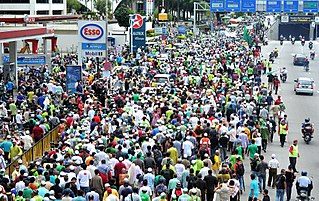
After the anti-Islamic short film Innocence of Muslims was released, on September 13, 2012 protests occurred at the U.S. embassy in Sana'a, Yemen, resulting in the deaths of four protesters and injuries to thirty-five protesters and guards. On September 14, the U.S. consulate in Chennai was attacked, resulting in injuries to twenty-five protesters. Protesters in Tunis, Tunisia, climbed the U.S. embassy walls and set trees on fire. At least four people were killed and forty-six injured during protests in Tunis on September 15. Further protests were held at U.S. diplomatic missions and other locations in the days following the initial attacks. Related protests and attacks resulted in numerous deaths and injuries across the Middle East, Africa, Pakistan, and Afghanistan.




